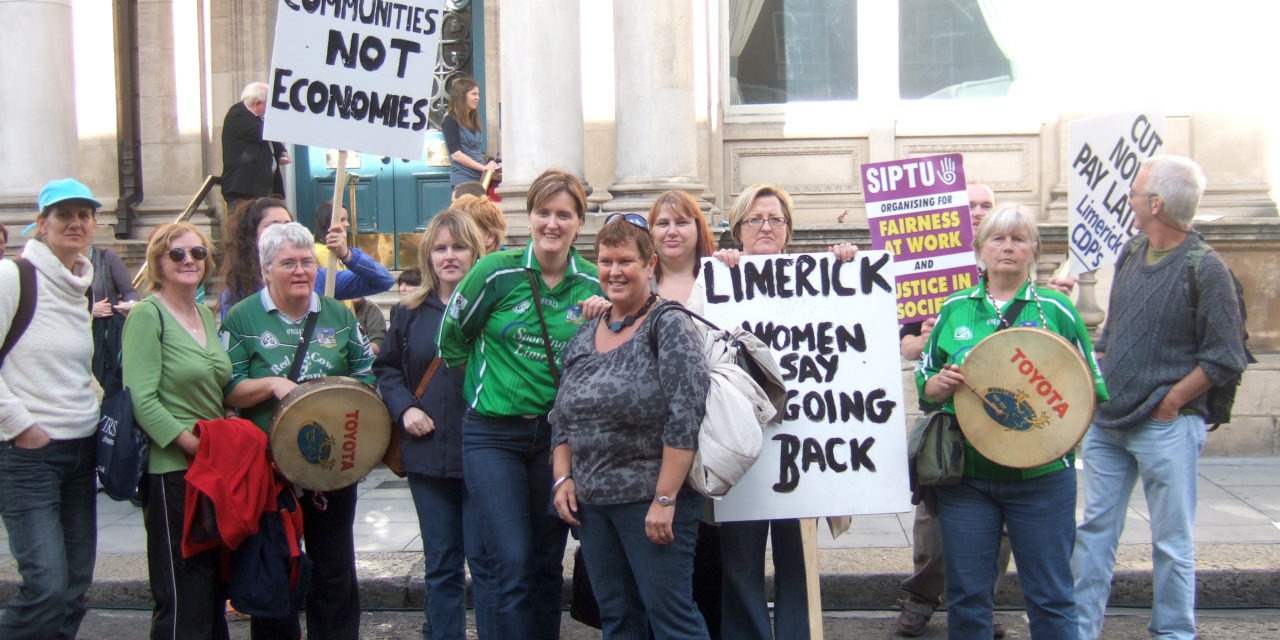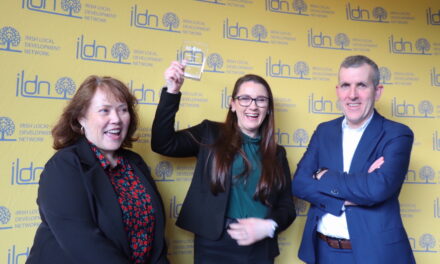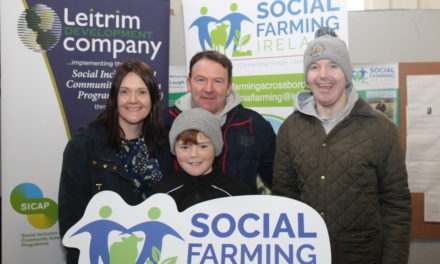Here’s a comprehensive analysis of what the proposed Programme for Government says that should concern and interest the many people devoted to community development and social inclusion.
– By Allen Meagher
CAPTION: Community seems to get more recognition today than it did a decade ago and this is reflected in the many pledges made in the proposed Programme for Government. Above: Protesters in 2009 march on the Dail. Austerity hit communities hard. Despite many protests, they were seen as an easy target. Photo: A. Meagher
INTRODUCTION
The proposed Programme for Government (PfG) from the Greens, Fianna Fail and Fine Gael talks up community development and social inclusion. By tomorrow, we’ll know if it is to be accepted or rejected. Even if rejected, the 126-page document is an eye-opener; it shows what negotiations produced after weeks of back and forth between three of the four biggest parties in the country. A link to the full document is provided below this summary/analysis.
OPPORTUNITIES FOR COMMUNITY DEVELOPMENT
The aspirational document includes 131 mentions of “community”, 12 of which relate to “community development”. Taken at face value, the document can be seen as encouraging for people working, volunteering and campaigning at community level.
There is talk of re-establishing much-valued Community Development Projects. There were once 180 such local projects and despite a hard-fought campaign against austerity a decade ago only a few survived (most were forcibly merged; some defunded).
The document also, for example, talks up the possibility of making it illegal to discriminate against someone based on their socio-economic status. This would be added to the current 9 grounds on which discrimination is illegal.
CRITICISM
The PfG has attracted criticism. Youth does not get the emphasis it should at a time when youth unemployment hovers around 50% with fewer opportunities than normal on the immediate horizon. Covid’s impact on young people has not been properly reckoned with. Capitalism’s greed also goes largely unchecked (white collar crime is barely covered) and many have found the document is insufficiently convincing on homelessness, inequality and healthcare.
On the environment, while most Greens appear to support it, some say it doesn’t go for enough to tackle climate change (two-thirds of GP members must vote in favour if the PfG is to be approved). And then there are those who view climate change activists as anti-business.
However, for the record, here’s what it has to say on social inclusion, community development and topics that will interest everyone dedicated to seeing Ireland’s communities grow stronger.
ADVISORY NOTE
The focus here is on social inclusion and community development. For relative brevity, even though they have direct and indirect impacts on communities, pledges (and omissions) on the following have been largely left aside from analysis: the Good Friday Agreement and all-island initiatives, Brexit, agriculture, business, transport, defence, health and climate action.
‘BOTTOM-UP’ & ‘NOBODY LEFT BEHIND’
Nobody but those who profited from austerity want to see it again – and the coalition is conscious of this. Four times the document says we must ensure that nobody is left behind (including during the transition to a lower-carbon future).
For communities specifically, the PfG promises “bottom-up mechanisms to ensure that local and national policymaking addresses community needs so that nobody is left behind.”
If formed, the government will seek “regular open engagement with all sectors of society”.
The section titled ‘Community Development, Social Inclusion and Public Participation’ is of particular interest.
CLIMATE ACTION AND A JUST TRANSITION
Actions to reduce emissions and make the transition to a low carbon economy are listed throughout the document and particularly in the chapter titled ‘A Green New Deal’ (pages 31-43). It is recommended you read this chapter in full. For example, every government department will within six months make climate action a core pillar of their work.
The social inclusion element to the coming changes are covered by what is called “a just transition”, a term made popular by former President Mary Robinson, among others. Climate action must be underpinned by a just transition. This ensures that the most vulnerable people whose lives will change in the transition are adequately compensated. Climate justice is about preventing poverty arising from the fight with polluters and carbon-heavy industries.
As the PfG says, “A just transition approach should insulate those most vulnerable to the changes envisaged… This will mean creating fresh opportunities for those sectors most exposed by the transition and supporting those in our community who are least equipped to make the changes.”
HOUSING AND HOMELESSNESS
Housing was one of the biggest issues raised during the election. The PfG says “local authorities are central to delivering housing” and pledges to increase the social housing stock “by over 50,000 over the next five-years.”
Furthermore, a referendum on the right to housing is likely to be held. A dedicated section details the plans on housing and homelessness (pages 53-58).
Elsewhere, the PfG also promises “to ensure that the housing needs of the Traveller Community are met by local authorities and ensure that existing funding is fully drawn down and utilised”. This has been talked about for some years without action being taken.
Also, students who are homeless, or live in emergency accommodation, or in direct provision will receive additional educational support.
Given past performance, campaigner Fr Peter McVerry told RTÉ he felt “very cynical” about the pledges made, much as he would like to see them come to pass (Link: https://bit.ly/McVerryPFG2020).
KEY NATIONAL COMMUNITY PROGRAMMES
The PfG pledges to continue with community-focused, anti-poverty programmes. It pledges to: “refine and build on a range of programmes to support communities, including CLÁR, the Social Inclusion and Community Activation Programme (SICAP), the Community Service Programme (CSP) and the Community Enhancement Programme (CEP).”
COMMUNITY DEVELOPMENT LINKED TO UN GOALS
The PfG commits to fully implement the current strategy, launched last year, by the Department of Rural and Community Development with the aim of supporting the Community and Voluntary Sector in Ireland to build “Sustainable, Inclusive and Empowered Communities”. That runs until 2024.
Looking beyond that, the new government would “initiate a new Anti-poverty, Social Inclusion and Community Development Action Plan framed around the 17 UN Sustainable Development Goals, underpinning sound community development practices, and reflecting a response to the COVID-19 pandemic and its impact on poverty and social inclusion.”
SHEDS, INNOVATION, EXPANDED FUND & CDPs
It will ensure that Men’s Sheds (approx. 400) and Women’s Sheds (new) are “properly resourced”.
The Social Innovation Fund Ireland programme will be continue to be supported – and enhanced “to help secure additional philanthropic funding sources specifically for community-based programmes and projects in the areas of climate justice, rural and community development”.
It will change the rules for applying to the Dormant Accounts Fund to include projects and programmes focused on biodiversity, environmental awareness and climate change.
It will introduce “on a phased basis, a number of projects similar in approach to Community Development Projects (CDPs)”.
An annual small capital grants programme administered through local authorities would be introduced (there have been similar such programmes previously) to help fund the maintenance, improvement, and upkeep of community centres.
LEADER TO HELP POST-COVID
The PfG will seek a loosening of the rules through which LEADER grants are provided to help “communities and small business” with the fallout from Covid-19. It says it will “apply to the EU for exemption from State Aid rules constraining the potential of the LEADER Programme to help communities and small business, particularly in the context of COVID-19.”
The PfG pledges to reduce bureaucracy for rural-based Local Development Companies (LDCs) that deliver LEADER on the ground. It promises to: “simplify and reduce bureaucracy and promote the role” of the the Local Development Companies delivering LEADER. Strong accountability and transparency mechanisms will remain key.
It will also:
– Review capital funding restrictions under the LEADER Programme for broadband.
– Increase grant aid available to private enterprise through LEADER from 50% to 75% for capital projects.
LDCs performing as independent Local Action Groups (an EU term) will continue to be supported by and report to Local Community Development Committees.
Ireland will also seek to make more use of EU support for Community-led Local Development (CCLD). The PfG pledges to: “Prioritise national and local government support to pursue extra EU funding opportunities through CLLD.”
The PfG also envisages a new “state-led Rural Development Programme to bridge the gap between the wind-up of the existing LEADER Programme and implementation of the new programme”.
Note: While key in the delivery of programmes nationally and while there is focus on their work, neither the agency Pobal nor Local Development Companies (LDCs) are specifically named in the PfG. Over 20 Government and EU funding programmes work with LDCs to connect with ordinary people and groups in communities. The work includes social inclusion, rural development, employment support, social enterprise to climate action. Nationally, as LDCs point out, they employ 2,100 people whose work helps support around 15,000 community groups and 173,000 individuals.
VOLUNTEERS / COMMUNITY CALL / REFUGEES
On Volunteering, the PfG promises to start measuring the value of volunteering through new wellbeing indices. It will publish a detailed new strategy “to support volunteering, including the development of a comprehensive supporting infrastructure and measures to disseminate best practice”. This was close to completion when the election was called in February and would need to be reviewed by a new government, particularly in light of our generally well-regarded response so far to the pandemic.
The new government would examine how it could build on the public goodwill evident in response to the Covid-19 ‘Community Call’. Elsewhere in the document, it says: “The COVID-19 pandemic illustrated the strength and depth of community life in Ireland.”
In an example of how refugees could be better supported, the PfG commits to better integration through the fledgling Community Sponsorship Ireland programme.
EARLY YEARS EDUCATION & CHILDCARE WORKERS’ PAY
Childcare provision is not being nationalised or anything near it, despite glaring problems that led tens of thousands of childcare workers and community volunteers to march in protest early this year. However, pay and conditions should improve.
Though too late for demoralised workers who quit the sector, a pay increase would be a partial win for campaigners. The PfG promises (by setting up a committee) to determine minimum pay rates, terms and conditions for childcare workers.
Meanwhile, a new agency called ‘Childcare Ireland’ will be set up to focus on quality, leadership, best practice, and professional development in community and private sector facilities. The regulatory burden on providers will be reduced (the regulations became so ridiculous that Joe Duffy was getting calls on it). Long-term career paths are also promised.
As with most pledges in the PfG, no timeline is provided.
FAMILY RESOURCE CENTRES
There are over 100 Family Resource Centres (FRCs) in the country. Though not named, the PfG pledges to “continue to invest in community and voluntary family support services and youth work, recognising their value in preventing harm and in responding to the needs of vulnerable families”.
AFTER-SCHOOLS SERVICES
One pledge that should see more work for FRCs, youth workers and volunteers reads: “We will increase the range of after-school services in schools or community hubs, to offer a range of education and family-focused measures.”
EDUCATION GENERALLY
Access to quality education is key to tackling poverty. The PfG commits to a range of education measures not detailed here. See pages 93-103.
HEALTH
For details on health see pages 43-53 in the PfG. With Covid-19, the health budget is expected to run over €20billion for this year. To mention just one proposal from a community perspective, the PfG commits – as previous governments did without fully following through – to implementing ‘Sláintecare’, a community-based primary healthcare service.
PUBLIC PARTICIPATION NETWORKS
The coalition will “carry out a comprehensive review of Public Participatory Networks and Local Economic and Community Plans, to ensure that they are fit for purpose for climate action and community development.”
Support will be continued for the Social Inclusion Forum.
DISABILITY
The PfG goes into considerable detail on disability (pages 77-79). Among the pledges are to “enshrine disability rights by finalising the legislation required following Ireland’s recent ratification of the UN Convention on the Rights of People with Disabilities (UNCRPD).” It will develop an implementation plan to put the law into practise.
Among many proposed measures, the coalition would, for example, increase “home support and Personal Assistance hours” and provide “additional respite nights for people with disabilities”.
Such commitments will be challenging and are complicated by the pandemic. Family Carers Ireland pointed out that 11,300 vulnerable people had their home care service suspended by the HSE because of Covid-19 challenges. Staff were reallocated to nursing homes, while some families were reluctant to have care staff visit as they were cocooning. By mid-June, 45% of families were waiting to have their care support restored.
LIBRARIES
On Libraries – where Ireland is setting a lead internationally – the PfG is short and sweet, committing to implementing the current public libraries strategy called ‘Our Public Libraries 2022 – Inspiring, Connecting and Empowering Communities’.
Meanwhile, while late in the day for many communities, An Post is being potentially seen as “a central hub for a wide variety of valuable community-focused services.”
SOCIAL ENTERPRISE
Similarly, on Social Enterprise, the PfG is brief but thorough in backing the unveiled national plan last year, saying, “We will build on Ireland’s first ever National Social Enterprise Policy.” The policy adoption was an historic breakthrough for the ROI, allowing us to start to catch up with Northern Ireland.
CHARITIES
On charities, the PfG is to the point, promising to “update legislative provisions with the Charities Regulator”, the aim being to “increase trust and confidence in the management and administration of charities”.
COMMUNITY ARTS
On community arts – notwithstanding various pledge on supporting the arts – the PfG will “develop innovative support schemes for small local festivals, amateur dramatics, and musicals”, introduce new bursaries for young artists and expand the ‘Creative Schools’ programme.
CLASS DISCRIMINATION
There are currently nine legal grounds for fighting discrimination and a tenth is tentatively proposed: “We will examine the introduction of a new ground of discrimination, based on socio-economic disadvantaged status to the Employment Equality and Equal Status Acts.”
LITERACY
The PfG pledges to publish a new 10-year literacy, numeracy, and digital skills strategy within the first year of government. It will also seek to “increase digital literacy among citizens and businesses”.
CREDIT UNIONS
Under the heading ‘National Economic Plan – Business Financing’, the PfG pledges to “Enable the Credit Union movement to grow as a key provider of community banking in the country.” It commits to “support Credit Unions in the expansion of services, to encourage community development.”
The new government would “review the policy framework within which Credit Unions operate”.
SENIOR ALERTS SCHEME
The PfG envisages continuing with the popular Senior Alerts Scheme, taking into account changing demographics and technological advancements.
NATIONAL BROADBAND
The multi-billion euro “rapid roll-out” of the National Broadband Plan will connect rural Ireland and support remote working, says the PfG.
OFFSHORE ISLANDS
There is little said about Islands specifically, bar that the Islands’ Action Plan (due) will be published this year.
DOMESTIC VIOLENCE
An updated National Preventative Strategy will be adopted and the government will implement “a plan for future refuge space on the publication of a review of domestic violence accommodation provision”.
Overall, there are ten measures planned to deal with the “an epidemic” of domestic violence and sex crimes.
POLICING & COMMUNITIES
The PfG pledges generally to build “stronger and safer communities”. It speaks of more community policing, use of CCTV, reform of the courts, and the creation of a new dedicated family courts system.
It talks of increasing the age limit to 24 years for recommending people to the Garda Youth Diversion Programme and implementing a new Youth Justice Strategy – drawing on learnings from an Icelandic model emphasising prevention, early intervention, and inter-agency collaboration.
It envisages an expansion of restorative justice and giving Gardai powers to deal with anti-social behavior from people on scramblers and quadbikes.
HATE CRIME, DRUGS MISUSE, GAMBLING
New legislation will be introduced on hate crime within a year of the new government’s formation and the existing, weak Incitement to Hatred Act 1989 will be strengthened.
The new government will “legislate against the coercion and use of minors in the sale and supply of drugs”. Other details are outlined under ‘Health’ (pages 43-53).
Online gambling online be regulated.
DIRECT PROVISION
Asylum-seekers are among the most vulnerable groups in society and the new government will abolish Direct Provision accommodation system and replace it with a new not-for-profit approach with human rights at its core.
The PfG states: “We are committed to ensuring that Ireland provides protection to those seeking refuge from conflict and persecution, as is required under international law.”
In the short term, conditions for asylum seekers currently in the system should improve: “This includes vulnerability assessments, the right to work, the ability to apply for driver licences and bank accounts, an independent inspection process, measures to reduce the length of time in processing decisions, mental health services, and the training of managers of Direct Provision Centres.”
The acceptance in the proposed PfG that DP must and will finally be replaced by a more humane, non-profit-driven system is a major win for all activists involved in campaigning over the years.
EQUALITY, MENTAL HEALTH, CARERS AND ADDICTION
The PfG’s authors deserves credit for going into detail on Equality, Mental Health, Family Carers and Drug Misuse. While not going into detail here on those subjects, the PfG pledges, for example, to implement the National LGBTI+ and the LGBTI+ Youth Strategy.
It promises to implement a National Traveller Health Action Plan. A “comprehensive” training, employment and enterprise support plan is promised for Travellers and Roma.
The new government will take “a zero-tolerance approach to racism” in amateur and professional sport.
It will re-establish the Galway City Community Based Alcohol Treatment Service.
These are but examples of the ambitious plans under those headings.
Elsewhere – in a section on ‘Defence’ – and in a levelling of the field, it promises that “all enlisted members of the Defence Forces have the same access to health care as officers currently do”.
YOUTH
It is fair to say that young people voted for more change than is promised in the PfG. Here we focus in detail on youth – a huge segment of the population. We look at what’s promised as an opportunity lost to pledge more for youth, given Covid-19’s turbocharged impact on their life-chances.
First, what’s promised:
The programme promises to encourage youth political participation (p7). Youth get specific mentions under climate action, mental health (implemention of the ‘Pathfinder’ interdepartmental unit on youth mental health), homelessness (a pledge to develop a strategy on national youth homelessness, participation (e.g. a National Youth Assembly will include rural and urban youth modules).
Under ‘Young People and Rural Ireland’, it promises to:
(1) “Increase funding for the national network of Comhairle na nÓg”.
(2) Encourage young people’s participation “in community development initiatives through special awards for youth-led involvement, e.g. the Tidy Towns Youth Award.”
(3) Continue to support the work of Young Social Innovators “to assist young people in responding to the COVID-19 pandemic and its aftermath in Ireland”. It also promises to “expand access to social innovation programmes to all post primary schools”.
Further commitments are made under the heading ‘Early intervention and Family Support’ and there will be a new youth strategy (it does not say when).
Much of this is a continuation of what’s already there, in the pipeline, or to be expected under a carry-on-as-you-are style of government.
Encouragingly, the PfG commits to “improve jobseeker supports for people aged under 24 over the lifetime of the Government” and to “increase the availability of activation schemes, including those run by local employment services”.
But is this enough, given Covid-19’s tsunami-like thrashing of sectors that normally provide employment for young people? eg tourism, hospitality, low-pay work.
James Doorley of the National Youth Council of Ireland says there is no real focus on youth unemployment in the PfG: “At a time when we have 51% youth unemployment and over 148,000 young people out of work this omission is hard to understand or justify.”
The PfG vaguely pledges to pay “particular attention” to “refugees and asylum seekers, the homeless and people living on low incomes.”
“We need the incoming Government to develop a youth employment plan in the first 30 days to assist young people get back to work,” says Doorley.
The sheer number of young people whose lives have been disrupted by the pandemic – something that could mark them for life – deserves focus. Opportunities lost need to be matched by new opportunities.
FAMILY FARMS, LOW INCOME AND ‘FORGOTTEN FARMERS’
The importance of supporting family farming, protecting those on low income and seeking justice for the ‘Forgotten Farmers’ are all highlighted in the PfG.
LOCAL FOOD / LOCAL LABOUR
While the PfG recognises the importance of food exports to Ireland, there will be a greater emphasis on supporting local food producers and local channels for sale and distribution. It envisages every town having a community-owned food market.
Local authorities will provide more support for community gardens, allotments, farmers’ markets and for living more locally and sustainably. Schools will be encouraged to buy more food locally.
A successor to ‘Foodwise 2025’ will be published within six months of government formation with an extra focus on biodiversity and developing local food markets.
Under ‘Housing’ where 50,000 homes are promised, the PfG says “local labour should be used to increase community gain”.
Under the PfG, the originally local but increasingly regionalised ‘Local Link’ transport service would see its passenger numbers triple. The service’s mini-buses connect people across rural Ireland.
PROCUREMENT
The PfG will make “community benefit and “sustainability” key features of government contracts that are put out to public tender.
New guidelines will aim to “optimise the community benefit of products and services procured” while minimising environmental impact and getting value for money.
“We are committed to evaluating and managing the environmental, economic, and social impacts of procurement strategies within the State”, it says.
In terms of timing, while it commits to some changes within “the next three years” the overall switch to sustainability in procurement is promised within “the lifetime of this Government”.
INSURANCE – COSTS & CARTELS
Even the officially-supported volunteer response to Covid-19 was slowed up initially by insurance concerns. This is the new norm. In recent years, fast-rising insurance premiums drove community groups to abandon plans or ideas they would otherwise have pursued to develop or boost their communities. Nationwide, community groups are waiting years for action to be taken on rising insurance costs.
Now, as communities seek new ways to express themselves and support each other while reopening after the pandemic struck, they could do much more if they did not have to worry about risk and rising insurance premiums.
The insurance industry – accused of cartel-like behavior – points the finger at fraudulent claims for higher costs. Thankfully, the PfG incidates that the proposed new government coalition isn’t buying it as the major issue.
“Insurance costs are a hugely significant issue for… a range of sporting, community, and voluntary groups,” the PfG states. It says that addressing anti-competitive practise is “critical” and a cabinet-led Committee on Economic Recovery and Investment “will prioritise the issue of insurance reform”.
The PfG promises to “punish and deter anti-competitive conduct” and to “tackle anti-competitive behavior” among insurance providers.
Overall, the PfG makes 21 commitments to tackle insurance costs.
Of interest to community endeavours, it will “consider” making changes to the Occupiers Liability Act and the Civil Liability Act (duty of care) “to strengthen waivers and notices to increase protections for consumers, businesses, sporting clubs and community groups”.
URBAN HORSE PROJECTS
The urban horse has been a feature of life in some areas for decades and, in a handful of instances, it has been creatively supported as an intervention in support of youth and intergenerational activity. However, legislation effectively banning the horse ownership in urban areas, a lack of support from some local authorities, and recent rises in insurance costs, have held back development of urban horse projects.
The PfG – under the heading ‘animal welfare’ – says it will: “Develop additional urban horse-welfare programmes, working with local authorities, charities, and community stakeholders to provide stabling facilities and educational programmes.”
Under ‘Sports’, the PfG pledges to “explore the potential development of the harness racing sector”. In urban areas, harness racing is called sulkie racing.
DEVELOPMENT AID
With Ireland taking up a temporary seat on the UN’s Security Council, the State will not want to be found lacking here.
The PfG pledges “to make annual, sustainable progress, ultimately achieving the UN target of 0.7% of Gross National Income by 2030”. This relates to the amount of State funding for overseas aid – every rich country is supposed to give 0.7% of its annual income to poor countries.
Ireland will continue to ensure that Irish aid remains untied to trade.
NET NEUTRALITY
Most people use and rely on daily, if not hourly, internet access. Of note, the new government will be committed to supporting the internet’s neutrality (i.e. opposing privatisation of what currently is a public resource).
TOWN CENTRES FIRST APPROACH
Local authorities will lead and collaborate on a ‘Town Centres First’ type approach to regenerate our towns and villages. Based on a tried and tested Scottish model, it will encourage more people to live in town centres.
The current Town and Village Renewal Scheme will be expanded.
LOCAL GOVERNMENT
Local authorities will be “incentivised” to bring forward pilot participatory budgeting projects – an approach already tried, tested and given the thumbs up in Dublin.
Future planning must be in line with the 17 UN Sustainable Development Goals when drafting development plans.
Every local authority will establish a climate action special policy committees.
Local authorities nationwide will provide public drinking water fountains.
All local authorities/Local Community Development Committees (LCDCs) will be asked to develop “a County Integration Strategy to promote, through a participative process, the inclusion of minorities”.
NATIONAL GOVERNMENT
A few notes:
At government level, cabinet sub-committees on health, education, housing, social affairs and equality, economic recovery, Europe, Brexit and Northern Ireland, and climate change will meet every four weeks.
At least half the Taoiseach’s nominees to the Seanad must be female.
Government departments will be reconfigured.
THE PfG’s PROMISES IN SUMMARY
“The actions taken over the next five years will define this nation’s future direction for decades to come,” predicts the proposed PfG.
Time will tell. It is not clear how much of what is promised is deliverable or will be truly different to what went before, apart obviously from climate change measures. However, It does stand out for having a strong focus on individual and community wellbeing (which will be measured) and it will not rely solely on economic data to measure achievement.
The PfG can be downloaded in full here: https://bit.ly/FFFGGPprog2020
By Friday, the country should know if the programme will be adopted, or if this is just a little footnote in history.





